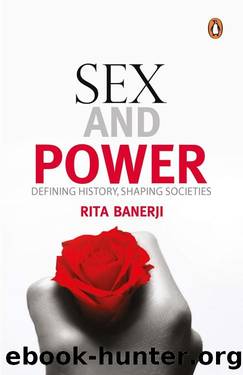Sex and Power: Defining History, Shaping Societies by Rita Banerji

Author:Rita Banerji [Banerji, Rita]
Language: eng
Format: epub
Tags: History, Feminism, Psychology
ISBN: 9780143064718
Amazon: 0143064711
Goodreads: 7937545
Publisher: Penguin Global
Published: 2009-04-15T00:00:00+00:00
HYPOCRISY OF THE NEW MASTER CLASS
Despite their puritanical decrees, and their religious fervency, most Muslim rulers, and the Mughals in particular, maintained a highly decadent lifestyle. It was the Mughal nobility that introduced sports like horse polo and horse racing to India. Animal contests, earlier unknown to India, were another favourite pastime of the nobility, when tigers, cheetahs, leopards, elephants and rhinoceroses would be pitted against each other. The royals and their guests would watch from a safe distance, from across the river, sitting on the palace terrace in the shade of elegant marquees that were stitched with gold and silver thread. On the other side of the river, about a hundred men with red-hot-iron-tipped spears would goad rutting animals to battle each other.73 Another much loved recreation was the mushaira or poetry recital. These were organized in opulent settings, where guests and renowned poets would sprawl out comfortably on handmade Persian rugs, amidst perfumed satin cushions, and display their poetic prowess under the soft glow of exquisite crystal chandeliers. During these revelries, gourmet food and alcohol would be served in silver platters and goblets, and people would drink to shed inhibitions, smoke opium and flirt through poetic repartee.74
Certain Mughal emperors were so addicted to alcohol and drugs such as opium and hashish that drinking and snorting binges would intermittently punctuate all their daily activities. For instance, Emperor Baburâs diary is replete with such references: seeing an enchanting vista he drinks to it; he visits a tomb and needs a drink; a drinking party follows the noon prayers; while gifts are being presented in court, he sucks on a hashish lozenge; he takes a boat ride and drinks all the way; and he enjoys the music concerts he attends only when they are accompanied by copious amounts of liquor.75
Although the devadasi tradition died out mainly because the temples that sustained this practice lost their wealthy Hindu patrons, the courtesan tradition, which had evolved independently of the temples, still thrived under the Muslims. The Mughals were enthusiastic patrons of the arts and the courtesans were sought after for their beauty as well as their superior skills in music and dance. Many prominent courtesans served as court entertainers for the Muslim nobility and some became their mistresses, travelling with them wherever they went. Muslim towns like Faizabad became renowned as homes to some of the most famous courtesans.76 However, even though these women were highly appreciated and patronized for their skills in classical music and dance, they lost the respectability they were once awarded in society.77 The 1899 novel Umrao Jaan Ada,78 made into a movie in 1981, was supposed to be an autobiographical account of a famous nineteenth-century courtesan of the same name.79 The story goes that Umrao Jaan, who was much coveted by the nobility as one of the most beautiful and talented courtesans, fell in love with a nawab, a Muslim nobleman. However, despite the intensity of their attraction, both on a physical and on an intellectual level, the
Download
This site does not store any files on its server. We only index and link to content provided by other sites. Please contact the content providers to delete copyright contents if any and email us, we'll remove relevant links or contents immediately.
Spare by Prince Harry The Duke of Sussex(5175)
Machine Learning at Scale with H2O by Gregory Keys | David Whiting(4292)
Fairy Tale by Stephen King(3370)
Will by Will Smith(2907)
The Bullet Journal Method by Ryder Carroll(2561)
Hooked: A Dark, Contemporary Romance (Never After Series) by Emily McIntire(2547)
Rationality by Steven Pinker(2352)
It Starts With Us (It Ends with Us #2) by Colleen Hoover(2340)
Can't Hurt Me: Master Your Mind and Defy the Odds - Clean Edition by David Goggins(2323)
Friends, Lovers, and the Big Terrible Thing by Matthew Perry(2219)
The Becoming by Nora Roberts(2188)
Love on the Brain by Ali Hazelwood(2059)
A Short History of War by Jeremy Black(1842)
The Strength In Our Scars by Bianca Sparacino(1840)
HBR's 10 Must Reads 2022 by Harvard Business Review(1839)
Leviathan Falls (The Expanse Book 9) by James S. A. Corey(1726)
A Game of Thrones (The Illustrated Edition) by George R. R. Martin(1721)
515945210 by Unknown(1660)
Bewilderment by Richard Powers(1607)
